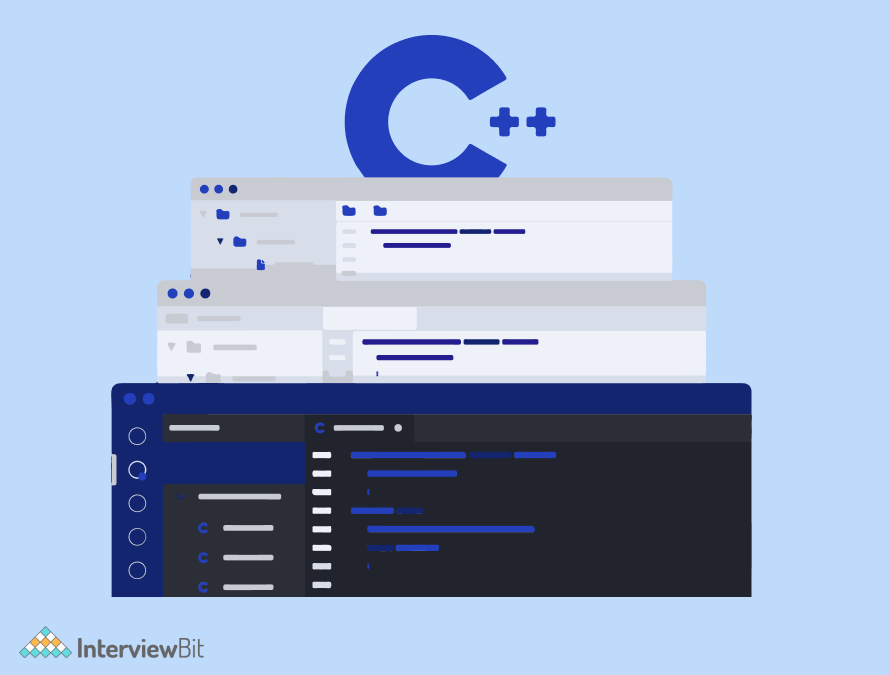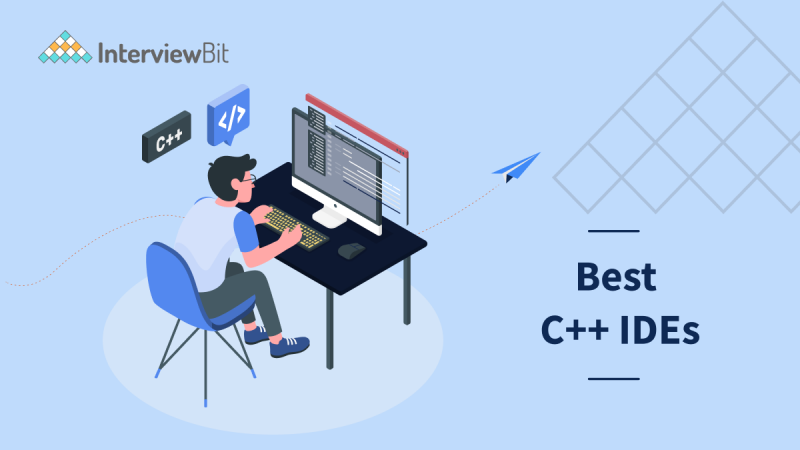- Introduction
- What is IDE?
- Best IDE for C++
- 1. Dev-C++
- 2. Visual Studio Code
- 3. Code::Blocks
- 4. CLion
- 5. CodeLite
- 6. QTCreator
- 7. Eclipse
- 8. C++ Builder
- Conclusion
- FAQs
- Q.1: Which IDE is best for C++ Beginners?
- Q.2: What IDE do professional C++ programmers use?
- Q.3: Which IDE is best for C++ and why?
- Q.4: What are the main features of C++ IDE?
- Additional Resources
Introduction
C++ is a powerful object-oriented programming language and since it is a little bit difficult language so creating an application from scratch can be a tedious task for developers hence, to make work simple and more productive it is important to work with an appropriate Integrated Development Environment(IDE) that provides everything under one roof instead of installing and maintaining different packages.
In this blog, we will be discussing different online C++ IDEs that are making the life of a developer easier by providing a wide range of features like auto code completion, smart indentation, code refactoring, etc. Moreover, each IDE will also be elaborated with its advantages and disadvantages so that programmers can decide which IDE suits their needs.

What is IDE?
Integrated Development Environment (IDE) is software that increases the speed of the development process and makes it easy for developers to write code by providing various functionality like code search, auto code completion, highlighting syntax, debugging, refactoring of code, etc under one environment. Each IDE doesn’t need to have all the features, different ide can outperform different tasks.
C++ IDEs are software that provides developers with a bundle of tools in a single environment rather than installing separate packages for different functionalities like auto-code completion, syntax highlighting, etc. These IDEs are used to work with application-specific platforms and thus remove the obstacles that come while developing the software. C++ ide help in making web pages, apps, new software, etc.
Best IDE for C++
C++ has various IDEs to work with. Now let’s deep dive into the features, pros, and cons of IDEs listed below:
1. Dev-C++
It is an IDE for developers who are beginners in C++. It is a free and full-featured, integrated IDE. This IDE is written in Delphi. It uses the MinGW compiler system for creating Windows as well as console-based C/C++ applications. It is also compatible with any other GCC-based compiler like Cygwin. You can use integrated debugging (using GDB) with this IDE. The debugger allows us to perform all the general debugging operations on source code.
Features
- Simple, good for beginners
- Free and open-source IDE
- Allows you to edit and compile the resource files.
- You can create your own project templates to create your own project types.
- Designed particularly for C++, so you can get started coding right away.
2. Visual Studio Code
It’s a cross-platform and an open-source editor provided by Microsoft. This editor is famous for various programming languages including C++. Earlier VS code was available only for Windows but now it is available for both Mac and Linux. Debugging, task running, syntax highlighting, code navigation, and version control are all included in VS Code, which is small enough to operate on outdated hardware. It comes with the greatest C++ compiler and allows you to easily manage numerous versions of the same software. However, Microsoft’s IDE rival Visual Studio may be a better choice for more sophisticated operations.
Features
- Designed to aid developers in the effective coding, building, and debugging of software.
- Highly portable.
- Provides version control support through git integration.
- Provides IntelliSense that means the ability of an auto-completion system.
- Cross-platform and multi-language development is a breeze with this tool.
3. Code::Blocks
Codeblocks is a free and open-source IDE for building C++ programs. It is one of the greatest C++ IDEs for Mac, supporting GCC (GNU Compiler Collection), Visual C++, and other programming languages. This program is available for Windows, Linux, and macOS. It includes all of the standard capabilities you’d expect from a good IDE: auto code completion, debugging, and compilation. Profiling, code coverage, code analysis, drag-and-drop, and other functionalities are available via customizable plugins. However, compared to other more sophisticated and simplified IDEs on the market, many of these functions are fairly basic.
Features
- Simple and easy for beginners.
- It’s written in C++ and designed to be simple to install and use right out of the box.
- Because it is lighter than many other IDEs, it can run on older hardware.
- Offers a wide range of flexible plugins.
4. CLion
JetBrains’ Clion is a modern IDE for running C and C++ on a variety of platforms, including Windows, Linux, and macOS. It gives intelligent code aid support, allowing the main focus to remain on the most vital aspects of the project. This is proprietary software so requires money for buying a license. This IDE has various features like easy debugging, easier for starting new projects, code refactoring, smart code analysis, etc.
Features
- Provides embedded terminal
- Provides support for CMake integration
- Offers cross-platform support
5. CodeLite
CodeLite originated as an SQLite-based autocomplete project but has since evolved into a cross-platform C++ IDE. Like other IDEs, it is also an open-source and free IDE that can support other languages apart from C++. Due to its lightweight and easy-to-use feature, it is considered to be a better solution for testing and debugging in C++. It provides a simple and comprehensive user interface that includes support for project management, code refactoring, code completion, debugging via GNU’s gdb, and integration with source code management systems like Git and Subversion(SVN).
Features
- Since it is a lightweight IDE, the operating speed is fast.
- Installation is easy.
- It provides a code completion engine based on CLang.
6. QTCreator
It is an IDE written in C++ that offers features like autocompletion, debugging, and syntax highlighting. It can also be used for Javascript and QML. GUI(graphical user interface) design and programming both are aided by QTCreator. Using Qt, you can write applications once and deploy them across desktop, mobile, and embedded operating systems without rewriting the source code. Qt is partly C++ and partly native code depending on the platform.
Features
- Fast and responsive IDE.
- Beneficial for Ui designing.
- Beneficial for multi-support systems i.e. easily available for the Linux platform as well.
7. Eclipse
It is also a free and open-source IDE with cross-platform assistance i.e. supports Windows, Linux, and macOS. It is an easy-to-use IDE with key features like auto-completion of code, syntax highlighting, debugging tools, and source navigation. If one wishes to manage a project remotely then Eclipse is a better option. A file with instructions for how to build a C++ program is generated by a C++ programing software tool known as Makefile
Features
- Customization is one of the important advantages of this IDE.
- Freely available for all operating systems.
- Good range of functionalities available through plugins and extensions.
8. C++ Builder
It is a cross-platform IDE by Embarcadero It provides a Clang-enhanced compiler with simple access to strong libraries, continuous integration, version control integration, database management, and a wide range of available plugins. C++ Builder helps in fast compilation and a cross-platform debugger. It also supports mobile app development on Android and iOS.
Features
- It supports modern C++17.
- You can make easy and rapid developments
- It provides version control integration.
- It has a responsive UI.
Conclusion
In this blog, we discussed several C++ IDEs and their effective usage. Using C++ IDEs provides prebuilt code templates that make the life of a programmer easier. Each editor has its features, none of them is perfect. It is preferable to have professional advice in choosing the editor for a better programming experience.
FAQs
Q.1: Which IDE is best for C++ Beginners?
Ans. C++ is a widely used object-oriented language and has a variety of IDEs but for a beginner to choose a perfect IDE, it is advisable to start with Code::Blocks since it is a lightweight and easy-to-use IDE with all the features available that are suitable for medium-sized projects.
Q.2: What IDE do professional C++ programmers use?
Ans. It depends on the user and platform. For Windows, Visual Studio mostly remains the first choice for C++ programming, for macOS Xcode can be the better option but if the multi-platform and free software concept is kept in mind then Eclipse ide is more preferable.
Q.3: Which IDE is best for C++ and why?
Ans: Visual Studio by Microsoft is the most popular IDE for C++ developers because of its handful of features like CMake support, IntelliSense i.e. code compilation technology, robust debugger, and a wonderful option for UI designers.
Q.4: What are the main features of C++ IDE?
Ans: There are a handful of reasons to use C++ ide like:
- automated validation of syntax.
- readymade code template offering
- setting breakpoints
- code refactoring
- syntax coloring
C++ IDEs prove to be powerful debuggers and robust editors.
